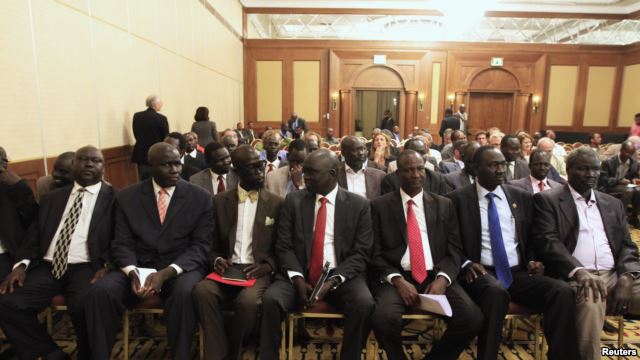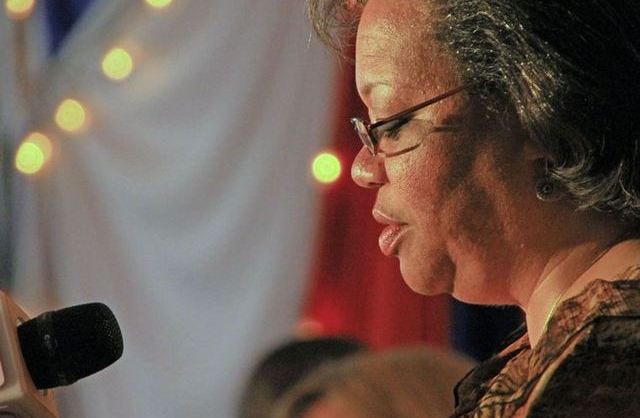 Members of South Sudan's rebel delegation are seen at the opening ceremony of peace talks in Ethiopia's capital Addis Ababa, Jan. 4, 2014. (Photo: Reuters)
Members of South Sudan's rebel delegation are seen at the opening ceremony of peace talks in Ethiopia's capital Addis Ababa, Jan. 4, 2014. (Photo: Reuters)
By Peter Clottey
Representatives of South Sudan’s warring factions will begin their first face-to-face talks on Tuesday following an agreement on the agenda and format of the peace negotiations, according to Dina Mufti, Ethiopia’s foreign ministry spokesman.
Mufti says a ceasefire will be on the agenda on Tuesday as well as several other issues.
“Definitely, a ceasefire will be on top of the agenda, the release of the detainees. There are some people who have been detained by the government side, the opening of the humanitarian corridor, because there was huge dislocation of the population, and other pertinent issues,” said Mufti.
Ethiopia’s Prime Minister Hailemariam Desalegn, backed by member states of the Intergovernmental Authority on Development (IGAD), is tasked with mediating the talks between the two warring factions.
So far the two sides have failed to adhere to a ceasefire demanded by the regional bloc, the African Union and the international community.
“The international community is watching [the factions] the South Sudanese people are watching them because, these people are yearning for peace, for stability,” said Mufti. “These are people who have emerged from decades of war and destruction and I think they can’t afford to come back to that cycle.”
Mufti says the two sides have demonstrated a willingness to engage in dialogue as part of efforts to end weeks of conflict in South Sudan.
“That is why they were working both working on Sunday and yesterday [Monday], and that is a sign of having enthusiasm for it because they have been working out the terms of reference, modalities, and so agendas were formulated that emerged from the proxy talks,” said Mufti.
He says regional foreign ministers from IGAD member states including, Kenya and Ethiopia played key roles as part of the proxy talks that led to talks between the warring factions.
South Sudan’s ongoing violence erupted after President Salva Kiir, a Dinka, accused former vice president Riek Machar, a Nuer, of attempting a coup. Macher, who is in hiding, denied the accusation.
Clottey interview with Dina Mufti
—
US Withdraws More Embassy Personnel from South Sudan

U. S. Ambassador Susan Page will remain in Juba and the embassy in Nairobi will provide consular services for Americans who stay in South Sudan, the State Department said.. (Photo: Jill Craig)
VOA News
The United States has withdrawn more personnel from the U.S. embassy in Juba and continues to recommend that U.S. citizens leave South Sudan immediately due to the deteriorating security situation in the world’s newest nation.
“We are taking this step out of an abundance of caution to ensure the safety and security of our diplomatic personnel,” the U.S. Department of State said in a statement.
U.S. Ambassador to South Sudan Susan Page will remain in Juba and will maintain “constant communication” with South Sudanese officials, the U.N. Mission in South Sudan (UNMISS) and her foreign counterparts, the statement says.
The U.S. Embassy in Nairobi will provide consular services for U.S. citizens in South Sudan while the embassy in Juba is closed. The statement did not say how long that would be.
Even as the United States draws down its embassy staffing levels in Juba, it has announced “an additional $49.8 million in assistance to help address the humanitarian crisis” in South Sudan, where U.N. officials have said the numbers of displaced persons could leap to 400,000 if a peace deal is not reached at talks in Ethiopia.
The U.S. Special Envoy Booth for Sudan and South Sudan, Donald Booth, is in Ethiopia supporting the negotiation efforts between delegates for President Salva Kiir and his former Vice President Riek Machar, the two main protagonists in the fighting that broke out in Juba on Dec. 15 and rapidly spread across the country.
Rebel fighters loyal to Machar control the two oil-producing states of Unity and Upper Nile and this week recaptured Bor after a bitter battle with government forces.
The talks in Addis Ababa, which are being led by the regional Intergovernmental Authority on Development (IGAD), got under way Friday, the Ethiopian Foreign Ministry said,
A U.S. Disaster Assistance Response Team (DART) based in Nairobi continues to lead U.S. efforts to support humanitarian operations and meet the needs of the people of South Sudan, the statement said.
The United Nations estimates that at least 1,000 people have died in nearly three weeks of violence in South Sudan, which rapidly took on ethnic overtones, with reports of people being targeted and killed for belonging to Kiir’s Dinka tribe or Machar’s Nuer tribe.
—
Related:
South Sudan general killed in ambush (BBC)
Join the conversation on Twitter and Facebook.

























